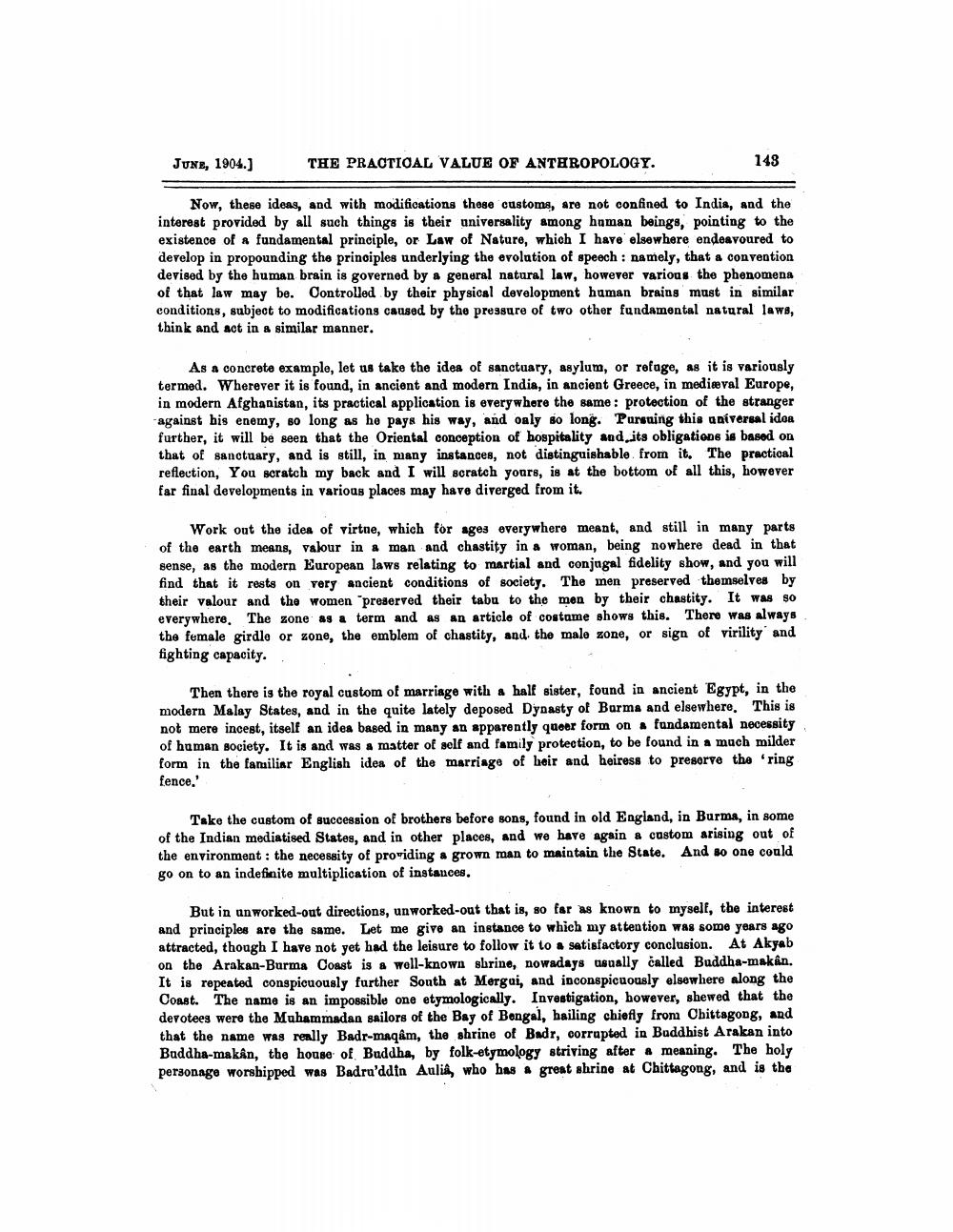________________
JUNE, 1904.)
THE PRACTICAL VALUE OF ANTHROPOLOGY.
148
Now, these ideas, and with modifications these customs, are not confined to India, and the interest provided by all such things is their universality among human beings, pointing to the existence of a fundamental principle, or Law of Nature, which I have elsewhere endeavoured to develop in propounding the principles underlying the evolation of speech : namely, that a convention devised by the human brain is governed by a general natural law, however various the phenomena of that law may be. Controlled by their physical development human brains must in similar conditions, subject to modifications caused by the pressure of two other fandamental natural laws, think and act in a similar manner.
As a concrete example, let us take the idea of sanctuary, asylum, or refage, as it is variously termed. Wherever it is found, in ancient and modern India, in ancient Greece, in medieval Europe, in modern Afghanistan, its practical application is everywhere the same : protection of the stranger against his enemy, so long as he pays his way, and only so long. Pursuing this universal idea further, it will be seen that the Oriental conception of hospitality and its obligations is based on that of sanctuary, and is still, in many instances, not distinguishable from it. The practical reflection, You scratch my back and I will scratch yours, is at the bottom of all this, however far final developments in various places may have diverged from it.
Work out the idea of virtue, which for ages everywhere meant, and still in many parts of the earth means, valour in a man and chastity in a woman, being nowhere dead in that sense, as the modern European laws relating to martial and conjugal fidelity show, and you will find that it rests on very ancient conditions of society. The men preserved themselves by their valour and the women preserved their tabu to the men by their chastity. It was so everywhere. The zone as a term and as an article of costame shows this. There was always the female girdlo or zone, the emblem of chastity, and the male zone, or sign of virility and fighting capacity.
Then there is the royal custom of marriage with a half sister, found in ancient Egypt, in the modern Malay States, and in the quite lately deposed Dynasty of Barma and elsewhere. This is not mere incest, itself an idea based in many an apparently queer form on fundamental necessity of human society. It is and was a matter of self and family protection, to be found in a much milder form in the familiar English idea of the marriage of beir and heiress to presorve the ring fence.'
Take the custom of succession of brothers before sons, found in old England, in Burma, in some of the Indian mediatised States, and in other places, and we have again a custom arising out of the environment: the necessity of providing a grown man to maintain the State. And so one could go on to an indefinite multiplication of instances.
But in anworked-out directions, unworked-out that is, so far as known to myself, the interest and principles aro the same. Let me give an instance to which my attention was somo years ago attracted, though I have not yet had the leisure to follow it to a satisfactory conclusion. At Akyab on the Arakan-Burma Coast is a well-known shrine, nowadays usually called Buddha-makan. It is repeated conspicuously further South at Mergai, and inconspicuously elsewhere along the Coast. The name is an impossible one etymologically. Investigation, however, shewed that the devotees were the Muhammadan sailors of the Bay of Bengal, hailing chiefly from Chittagong, and that the name was really Badr-maqêm, the shrine of Badr, corrupted in Buddhist Arakan into Buddha-makan, the house of Buddha, by folk-etymology striving after a meaning. The holy personage worshipped was Badruddin Aulia, who has a great shrine at Chittagong, and is the




